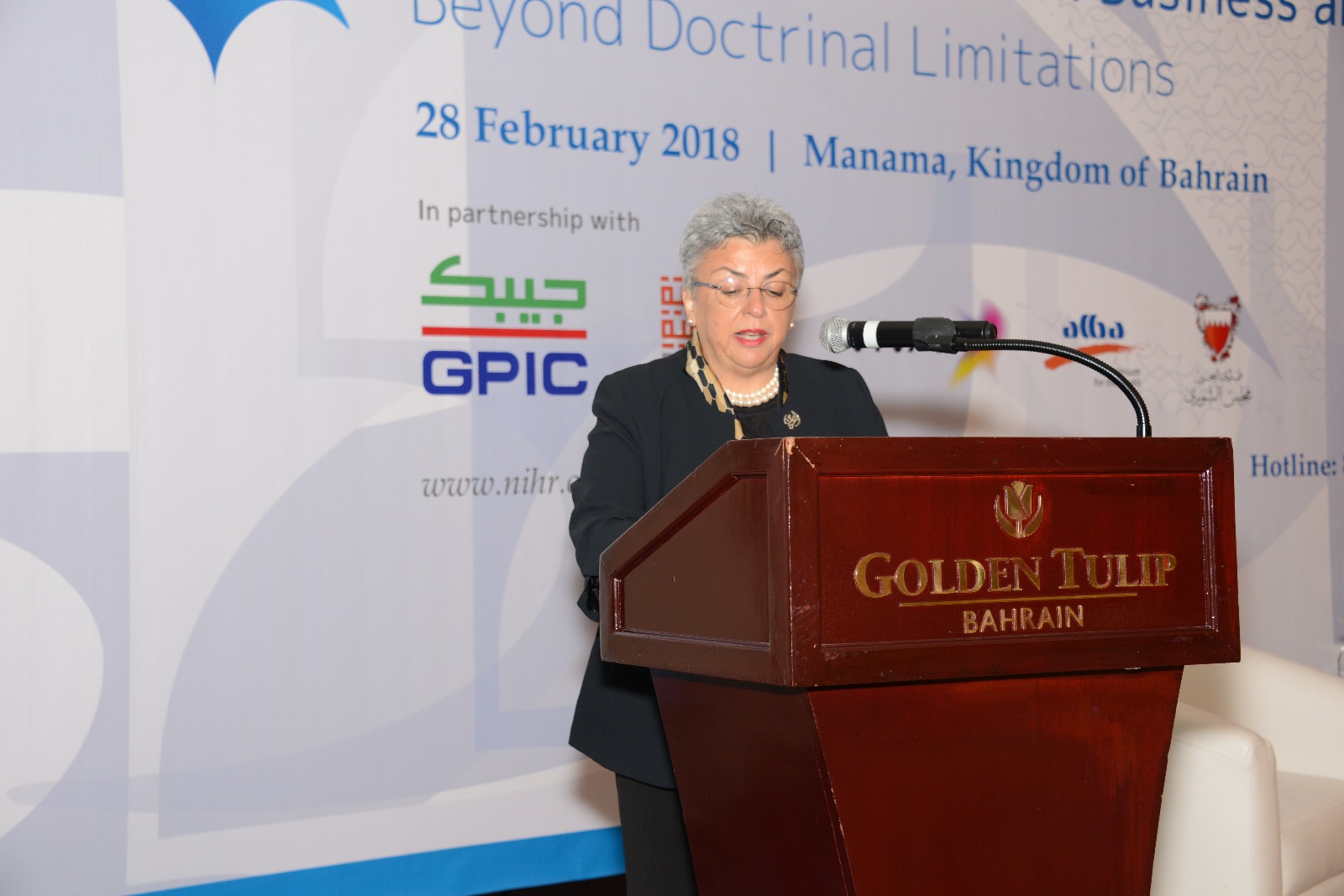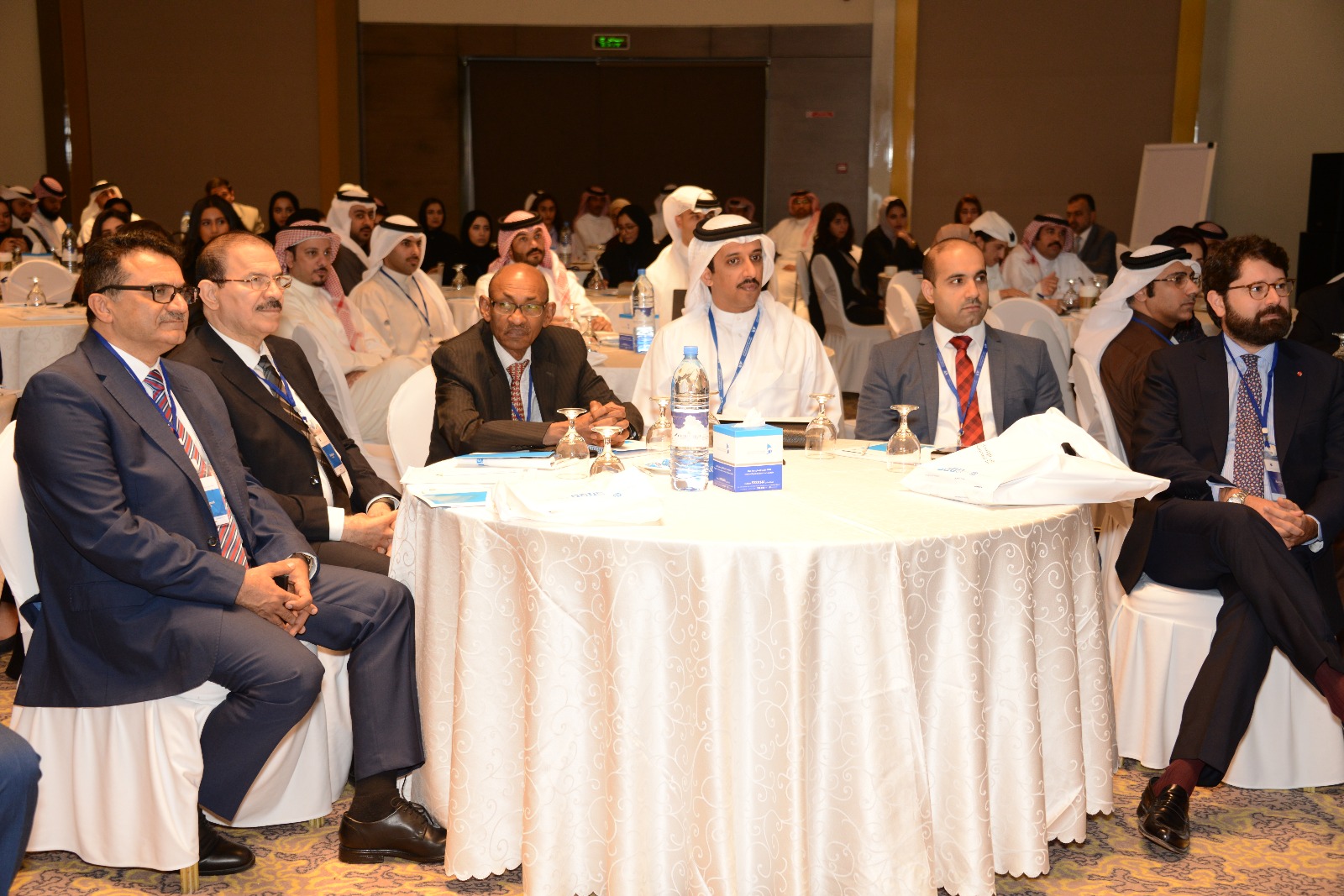Launch of the International Forum on Business and Human Rights in the Kingdom of Bahrain

An International Forum on Business and Human Rights started on Wednesday morning (February 28th) at the Golden Tulip Bahrain Hotel. It was organized by the National Institution for Human Rights (NIHR) under the sponsorship of Gulf Petrochemical Industries Company (GPIC), Bahrain Institute for Political Development (BIPD), Shura Council, Aluminum Bahrain (Alba) and VIVA Bahrain. The Forum, held under the theme (Business Administration and Human Rights), was attended by about 200 participants representing segments of civil society organizations and human rights defenders, as well as those interested in human rights issues, representatives of academic, advisory and legal bodies, companies, commercial establishments and the private sector.

At the beginning of the Forum, Ms. Maria Khouri, Chairperson of the NIHR, welcomed the audience and said, “human rights and business administration are priorities of the NIHR’s work”, emphasizing the need to link them to the 17 Sustainable Development Goals adopted by the UN for 2030. She said that holding this Forum will contribute significantly to the promotion and protection of human rights in the business sector.
The first session entitled “Business Administration and Human Rights: Challenges and Obstacles” was attended by Prof. Chris Cedotti, an international human rights expert, and Dr. Khalifa bin Ali Al-Fadel. NIHR’s Secretary-General in Bahrain, highlighting the most important challenges and obstacles in business administration and human rights, especially after the great openness witnessed by the countries of the world, and the accompanying globalization and emergence of multinational corporations with multiple practices, where the weak standards of health and safety in work fields, pollution, the development of the technology and information sector and the subject of intellectual property and copyright in creativity were discussed.
During the second session, participants were divided into three working groups, each group to discuss a number of themes and prepare the recommendations. The first group discussed “Ambitions and Challenges in the Work Environment”, and addressed the relationship between human rights and the work environment, the role of the employee in addressing problems related to discrimination in the workplace and the reflection of the effects of the work environment on business and human rights, under the direction of Dr. Riyad Mohammed Sayadi, Assistant Professor of Commercial Law, University of Bahrain.
The second group, led by Dr. Aisha Bouskhar, Information Technology College, University of Bahrain, discussed the theme of “Information Space and the Right to Privacy”, and defined the right to privacy and its relevance to the large data, the economic and social implications of safety in the information space, the challenges of information safety and the ways of protecting it, the threats to national security through the misuse of this data and the role of public and private sectors in raising awareness of the importance of safety in the information space.
The third session, supervised by Dr. Pascal Bury, Dean of the College of Law, Royal University for Girls, focused on “Intellectual Property Rights of Pharmaceutical Industry”, the extent to which patients benefit from some types of medications similar to original ones, and how copyright affects business and human rights, and explained the pros and cons of drugs similar to original ones to commercial companies.
All groups made recommendations, the most important of which are: to reduce business and human rights problems by promoting the exercise of United Nations guidelines on this matter, and to identify and share good practices in business administration and human rights. In addition, business enterprises should not violate the principles of fundamental rights enshrined in the International Labor Organization (ILO) Declaration on Fundamental Principles and Rights at Work, as well as the fundamental rights enshrined in the International Covenants on Civil and Political Rights and Economic, Social and cultural rights acceded to by the Kingdom of Bahrain, regardless of the size, sector, ownership or nature of the business enterprise.
The last session focused on “Reality and Aspirations of Business Administration and Human Rights”, attended by Mr. Nazeer Al-Islam, a member of the Bangladesh Human Rights Commission (BHRC), and Dr. Amal bint Mohammed bin Abdullah Al Hashmi, a member of the Oman Human Rights Commission (OHRC), who reviewed the guidelines on business and human rights, which were unanimously adopted by the Human Rights Council in 2011, which are the basic principles on business and human rights, as well as international efforts in this area.
The session also focused on the reality of business administration and human rights in the Kingdom of Bahrain, being one of the most advanced countries in this area, where Ms. Maria Khouri, Chairperson of the NIHR, spoke about the responsibility of commercial institutions to respect the principles of human rights through their compliance with international and local norms and laws applicable in the human rights area, especially the labor laws and the health, safety and pollution laws, emphasizing that the Kingdom of Bahrain has taken a pioneering step in this regard, by establishing the institutions to protect these rights, notably the Labor Market Regulatory Authority (LMRA), the National Health Regulatory Authority (NHRA) and the National Institution for Human Rights (NIHR), which are now playing an important role in establishing and promoting a culture of respect for human rights in the various sectors of the Kingdom.


